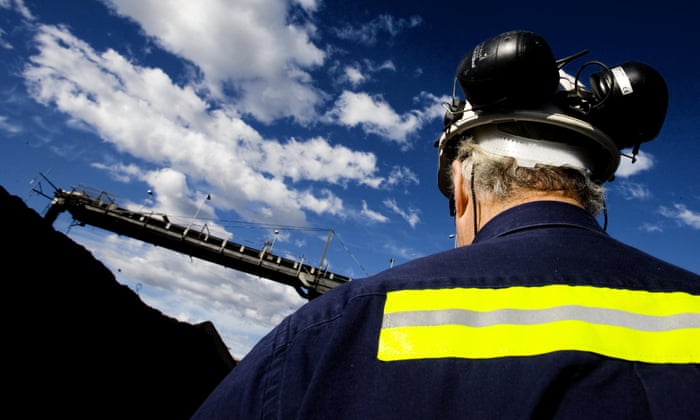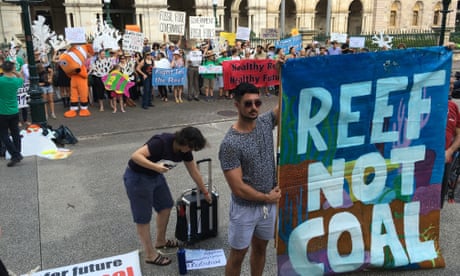Mining
Cost of stopping new coal and gas projects in freefall, costings reveal
Exclusive: The revenue the federal government would lose if it stopped all new or expanded thermal coal and gas projects has dropped by 80% in 2.5 years

In April 2013, there were 19 coal mines that had been publicly announced – a number that had dropped to just 10 by October 2015. Photograph: Fairfax Media/Fairfax Media via Getty Images
Michael Slezak
@MikeySlezak
Monday 4 April 2016 17.15 EDT Last modified on Monday 4 April 2016 17.17 EDT
As the fossil fuel industry appears increasingly shaky, the cost to the federal budget of stopping all new coal and gas projects in Australia has plummeted – costing less than 20% of what it was estimated to just 2.5 years ago, according to official parliamentary costings seen by Guardian Australia.
The Greens have a policy of approving no new thermal coal or unconventional gas projects in Australia. That includes new mines, as well as expansions to existing mines.
In 2013 the party obtained costings from the parliamentary budget office detailing their estimate of how much revenue the federal budget would lose as a result of reduced tax and any other costs, if the policy was implemented.

Adani's Carmichael mine approval labelled 'economic stupidity'
Read more theguardian.com
It was then estimated the policy would result in the government missing out on $1.5bn over the forward estimates – the four years to July 2017.
The Greens asked for the same advice again this year and that figure dropped dramatically to just $290m over the forward estimates – the four years to July 2019.
With coal and gas prices dropping around the world, the number of new fossil fuel projects expected to be developed is now fewer than it was in 2013. In addition, the profits those companies would make – and the tax the government would therefore miss out on if they were banned – has reduced over the period.
The costings fit with several other developments in recent months.
Of the $1.2bn wiped from the tax revenue the government would expect to get from new coal and gas projects, just $70m was a result of the minerals resource rent tax being scrapped. The vast majority was due to fewer and less profitable projects.
At the time of writing, the latest report used by the Parliamentary Budget Office to examine the number of future coal and gas projects was not available. But comparing the report used in the 2013 costing and the most recently available report (from October 2015) reveals a sharp decline in proposed coal and gas projects.
In April 2013, there were 19 coal mines that had been publicly announced – a number that had dropped to just 10 by October 2015.
Similarly, publicly announced liquefied natural gas, gas and oil projects had dropped from 12 to three over the period.

New Acland Coal project will generate far fewer jobs than claimed, court hears
Read more theguardian.com
Coal projects that had reached “feasibility stage” – where more detailed planning work had been done – dropped from 57 to 39 over the period while those at the “committed” stage dropped from 16 to six.
The Greens senator and environment spokeswoman, Larissa Waters, said the figures show their policy was sensible.
“As the world transitions to clean energy, the taxes collected by the federal government from the fossil fuel sector are rapidly diminishing,” she told Guardian Australia. “We have everything to gain from embracing the job-rich clean energy industry and ending approvals of new coal or gas mines.
“Ultimately, the fossil fuel sector is a burden on our federal budget due to the subsidies it receives and the economic costs it adds through global warming and destruction of land and water.”
Waters said it also showed that, regardless of any policies that hasten the decline of the industry, the government needed a plan to create new jobs for those in the industry.
“The thousands of Australian workers the fossil fuel industry is sacking as it declines must not be left in the lurch.”
She said those jobs should come from the work needed to rehabilitate mine sites and in the new clean energy industry.
The executive director of coal at the Minerals Council of Australia, Greg Evans, said the coal industry had contributed more than $37bn in both company tax and royalty payments between 2007-08 and 2013-14.
“It is an enduring industry and confining any analysis to just the forward estimates period misses the mark about the positive long-term demand outlook,” he said.
“The industry makes a substantial economic contribution and will continue to do so underpinning both base load energy provision in Australia and providing competitive and high-quality coal for Asia’s energy and steel making requirements.”
theguardian.com |







